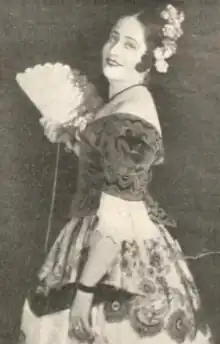Thalia Sabanieva
Thalia Sabanieva (23 December 1889[1] – 20 March 1963), also seen as Thalia Sabanieeva, was a Greek soprano.
Thalia Sabanieva | |
|---|---|
 Thalia Sabanieva as Rosina in The Barber of Seville, from a 1923 publication | |
| Born | 23 December 1889 Greece |
| Died | 20 March 1963 New York |
| Other names | Thalia Samossoud |
| Occupation | Opera Singer |
| Years active | 1920s, 1930s |
| Spouse | Jacques Alexandria Samossoud |
Early life
Thalia Sabanieva was born in Athens in 1889. She was proud of her Greek birth,[2] and spoke Greek, but objected to being called a "Greek singer", because she was educated in Russia. "What I am as a singer I owe entirely to Russia", she declared in 1937.[3] She studied music with Vera Cehanovska, mother of Russian baritone George Cehanovsky.
Career
Sabanieva sang with the Metropolitan Opera in New York[4] from 1923 to 1930.[5][6][7] She sang with the San Francisco Opera in the 1924–1925 season, appearing in L'Amico Fritz, Madama Butterfly, and Manon.[8] In 1928 she made several recordings for the Victor Talking Machine Company.[9] In 1933, she sang in the American premiere of Tchaikovsky's Mazeppa.[10] She was a member of Max Panteleieff's New York-based Russian Opera Company in the mid-1930s.[11]
Sabanieva was often on the programs of charity benefit concerts and special events. In 1933, she sang a duet with Mario Chamlee at a gala marking the 25th anniversary of Giulio Gatti-Casazza's directorship at the Metropolitan Opera. In 1935, she sang at a benefit concert for Jewish artisans in Poland, with cellist Mila Wellerson, at New York's Town Hall venue,[12] and at another benefit performance with Lucrezia Bori and Tito Schipa, for the WIlloughby House Settlement in Brooklyn.[13] In 1937 she sang at a benefit concert at Carnegie Hall alongside Elisabeth Rethberg, Josephine Antoine, and other singers, raising funds for Chrystie Street House, a shelter for homeless men.[14]
Sabanieva had two film credits, for a supporting role in a Greek film, That's Life (1935), and in the title role in a film adaptation of Natalka Poltavka (1937),[15] though she was an unlikely choice to play a young heroine by then.[16] She was featured in a LIFE magazine photograph, when her dog appeared on the magazine's cover in 1944.[17] Sabanieva taught voice students later in life.[18]
Personal life
Sabanieva was briefly married Russian conductor Jacques Alexandria Samossoud from 1927 to 1929;[19][20] he later married Clara Clemens in 1944.[21] Thalia Sabanieva died in 1963, in New York.
References
- Some sources give Sabanieva's birth year as 1895, but she gave the 1889 date in official paperwork, such as her application for United States citizenship; via Ancestry
- Mason, Redfern (1924-10-30). "Greek Artiste Fires Hearts of Audience". The San Francisco Examiner. p. 14. Retrieved 2021-06-19 – via Newspapers.com.
- "Sabanieva Arrives to Appear in Opera". Evening Star. 1925-12-07. p. 5. Retrieved 2021-06-19 – via Newspapers.com.
- "Greek Soprano to Sing at Metropolitan". New York Herald. 1922-09-24. p. 16. Retrieved 2021-06-19 – via Newspapers.com.
- "Thalia Sabanieeva". Metropolitan Opera Family database. Retrieved 2021-06-19.
- "MARION TALLEY IN 'LUCIA.'; Welcomed by Throng at Matinee -Thalia Sabanieeva Sings Juliette". The New York Times. 1927-02-20. ISSN 0362-4331. Retrieved 2021-06-19.
- ""SIEGFRIED" GIVEN AGAIN.; Whitehill in Role of Wanderer and Mme. Sabanieeva of Forest Bird". The New York Times. 1930-03-25. ISSN 0362-4331. Retrieved 2021-06-19.
- "Thalia Sabanieva". San Francisco Opera Performance Archive. Retrieved 2021-06-19.
- "Sabanieva, Thalia". Discography of American Historical Recordings. Retrieved 2021-06-19.
- "Ukrainian Singers Act Epic 'Mazeppa'". The New York Times. February 5, 1933. p. N2 – via ProQuest.
- "City to Get Season of Russian Opera". The New York Times. January 15, 1934. p. 13 – via ProQuest.
- "CELLIST AND SOPRANO GIVE JOINT PROGRAM; Recital by Mila Wellerson and Thalia Sabanieeva Aids Artisans in Poland". The New York Times. 1935-05-12. ISSN 0362-4331. Retrieved 2021-06-19.
- W.b.c (1935-03-16). "BORI SINGS IN 'MIGNON' AT BENEFIT MATINEE; Schipa Heard as Poet Hero and Thalia Sabanieeva Takes the Place of Lily Pons". The New York Times. ISSN 0362-4331. Retrieved 2021-06-19.
- "Music Notes". The New York Times. November 20, 1937. p. 21 – via ProQuest.
- America Film Institute (1997). Within Our Gates: Ethnicity in American Feature Films, 1911-1960. University of California Press. pp. 700–701. ISBN 978-0-520-20964-0.
- Martynowych, Orest T. (2014-09-05). The Showman and the Ukrainian Cause: Folk Dance, Film, and the Life of Vasile Avramenko. Univ. of Manitoba Press. ISBN 978-0-88755-472-8.
- "City Dogs". LIFE. April 3, 1944. p. 73.
- "Russian Singer Featured with Balalaika Ensemble". The Bridgeport Post. 1970-11-22. p. 64. Retrieved 2021-06-19 – via Newspapers.com.
- "Thalia Samoosoud Sues Film Director". The Miami News. 1943-11-16. p. 4. Retrieved 2021-06-19 – via Newspapers.com.
- "In Filmland". Siskiyou Daily News. 1943-11-16. p. 2. Retrieved 2021-06-19 – via Newspapers.com.
- "Mark Twain's Daughter Weds Husband's Friend". The News Journal. 1944-05-12. p. 17. Retrieved 2021-06-19 – via Newspapers.com.